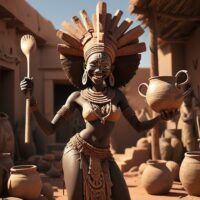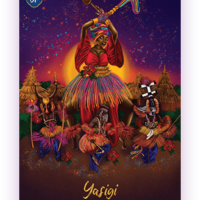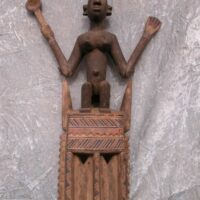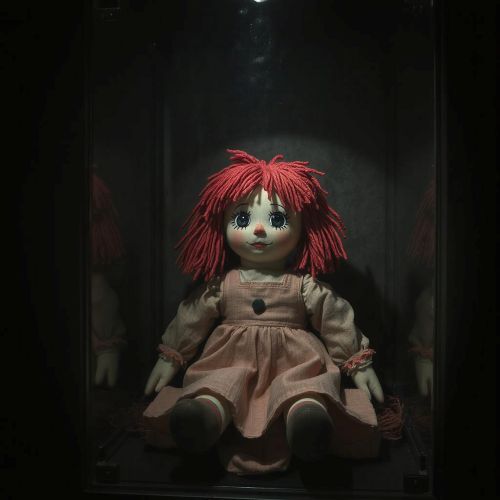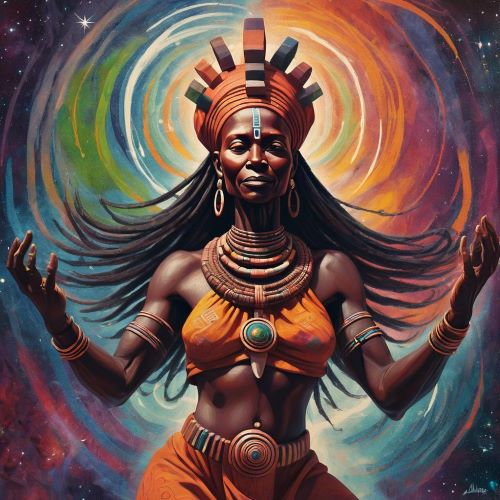Yasigi : Goddess of Alcohol
Listen
At a glance
| Description | |
|---|---|
| Origin | Dogon Mythology |
| Classification | Gods |
| Family Members | Amma (Mother) |
| Region | Mali |
| Associated With | Beer, Alcohol, Celebration, Dancing |
Yasigi
Introduction
Yasigi, a revered goddess in Dogon mythology, is known for her connection to dancing, beer-making, and masks. As the daughter of Amma, she plays a vital role in Dogon rituals, particularly the Sigi ceremony, a grand event held every sixty years to honor ancestors and the creation of the Mask of the Dead. Often depicted dancing with a beer ladle, Yasigi embodies joy, creativity, and resilience, making her a central figure in Dogon cultural and spiritual traditions.
Physical Traits
Yasigi is portrayed as a dynamic and powerful female figure in Dogon mythology. Sculptures and carvings depict her with prominent features, such as large breasts, symbolizing fertility and abundance. Often shown holding a beer ladle, she embodies her role as the goddess of brewing and communal festivities. Her lively dancing posture reflects joy, vitality, and the celebratory spirit central to Dogon culture. Beyond her divine attributes, Yasigi’s imagery underscores the Dogon people’s deep respect for the feminine principle and its vital role in sustaining life and tradition.
Family
Yasigi, the daughter of Amma, the supreme creator deity in Dogon cosmology, shares a complex relationship with her twin brother, Yurugu, who symbolizes chaos and disorder. To shield her from his disruptive influence, the Nommo twins—divine beings tasked with maintaining balance—protected and guided her. This dynamic reflects key themes in Dogon mythology, emphasizing the struggle between order and chaos, the role of divine intervention, and the importance of balance in the cosmic order.
Other names
The Aigamuxa is sometimes called Aigamuchab, with the two names used interchangeably in different Khoikhoi traditions. In some accounts, they are also referred to as “Bushmen,” though this term more commonly applies to the San people. This association likely stems from their deep connection to the wild and their fearsome reputation. Another name, “Night Stalker,” highlights their nocturnal nature and the terror they bring to those wandering after dark. These varied names reflect regional differences in how the creature is perceived within Khoikhoi mythology.
Powers and Abilities
Yasigi is revered as the goddess of beer-making, dance, and festivities, embodying the spirit of communal gatherings in Dogon culture. Beer, central to both daily life and sacred rituals, is one of her divine gifts, symbolizing nourishment and social unity. Beyond brewing, she is closely linked to masks and dance, integral elements of Dogon ceremonies.
Her influence is particularly evident in the Sigi ceremony, a grand ritual held every sixty years to honor ancestors and the creation of the Mask of the Dead. Through dance and mask-wearing, Yasigi serves as a bridge between the human and spiritual realms, ensuring cultural continuity and ancestral reverence. Additionally, her association with protection is reflected in her own story, as the Nommo twins shielded her from her unruly brother, Yurugu. Her presence in mythology highlights themes of creativity, ritual, and balance within Dogon cosmology.
Modern Day Influence
Yasigi’s influence endures in modern interpretations of Dogon mythology and African spirituality, inspiring discussions on gender, creativity, and cultural identity. Her association with beer-making and festivity symbolizes resilience, joy, and communal unity—values that transcend time and place.
In the visual arts, Yasigi’s image appears in sculptures, paintings, and performances that celebrate African heritage. Scholars continue to study her role in the Sigi ceremony, exploring its deep connections to Dogon cosmology, ritual practices, and social structures. Beyond academia, Yasigi represents freedom and self-expression, encouraging individuals to embrace their unique energy and passions.
Despite external influences like tourism and shifting social dynamics, the Dogon people maintain their cultural traditions. Rituals such as the dama funeral ceremony uphold their spiritual heritage, ensuring that ancestral connections remain strong. Younger generations continue to learn and share these customs, preserving Yasigi’s legacy and the broader Dogon cosmology for the future.
Related Images
Source
World Mythos. “Yasigi.” Retrieved from World Mythos.
AMUM Virtual Exhibitions. “The Powerful Woman A Satimbe Mask.” Retrieved from AMUM Virtual Exhibitions.
“OGO – the Dogon God of Chaos (African mythology) – Godchecker.” Godchecker, 2 Nov. 2018.
“Living and Spirtual Worlds of Mali’s Dogon People.” Focus on Geography, 27 Apr. 2016.
“[PDF] Masks and Mythology among the Dogon.pdf.”
“Dogon religion – Wikipedia.” Wikipedia.
Frequently Asked Questions
What is lorem Ipsum?
I am text block. Click edit button to change this text. Lorem ipsum dolor sit amet, consectetur adipiscing elit. Ut elit tellus, luctus nec ullamcorper mattis, pulvinar dapibus leo.
What is lorem Ipsum?
I am text block. Click edit button to change this text. Lorem ipsum dolor sit amet, consectetur adipiscing elit. Ut elit tellus, luctus nec ullamcorper mattis, pulvinar dapibus leo.
What is lorem Ipsum?
I am text block. Click edit button to change this text. Lorem ipsum dolor sit amet, consectetur adipiscing elit. Ut elit tellus, luctus nec ullamcorper mattis, pulvinar dapibus leo.
What is lorem Ipsum?
I am text block. Click edit button to change this text. Lorem ipsum dolor sit amet, consectetur adipiscing elit. Ut elit tellus, luctus nec ullamcorper mattis, pulvinar dapibus leo.
What is lorem Ipsum?
I am text block. Click edit button to change this text. Lorem ipsum dolor sit amet, consectetur adipiscing elit. Ut elit tellus, luctus nec ullamcorper mattis, pulvinar dapibus leo.

